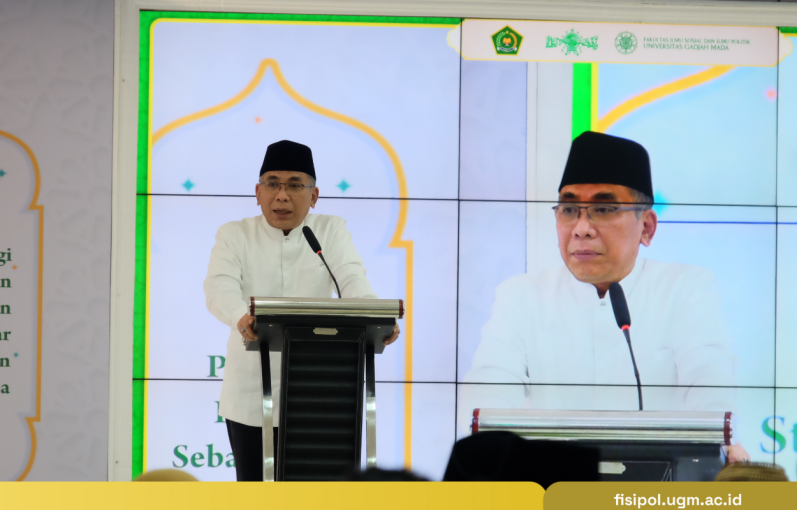
Yogyakarta, October 8th 2024─With a long history of pesantren as a center of community activity, the institution has developed massively in Indonesia. Pesantren have become the center of community livelihood, both in terms of science and community empowerment. Therefore, it is necessary to map strategic issues to strengthen the roadmap of pesantren education and proselytization (dakwah).
Through the collaboration of the Ministry of Religious Affairs of the Republic of Indonesia, the Executive Board of Nahdlatul Ulama (PBNU), and the Faculty of Social and Political Sciences of Universitas Gadjah Mada, the Pesantren Symposium of 2024 was held. The event was held offline at Auditorium Mandiri 4th floor, Faculty of Social and Political Sciences UGM with the theme “Strategies for Strengthening Islamic Boarding Schools as Pillars of Indonesia’s Future”. The 2024 Pesantren Symposium was presented to map the strategic issues of pesantren.
The existence of pesantren cannot be separated from the long history of national education development. For more than two decades, pesantren have proven their relevance as an indigenous Indonesian educational institution that continues to grow. Not only being a learning institution, pesantren developed itself as a successor of social community activities.
This is in line with Law No. 18 of 2019 on Pesantren, which emphasizes the strategic role of pesantren in three main areas, namely education, dakwah, and community empowerment. This broad scope of roles shows that pesantren have great potential to make a significant contribution to the progress of the nation. Therefore, there is a need for a more detailed policy design on how pesantren grow and produce people who are ready to play a role in society.
Dr. H. Ahmad Bahiej, S.H.M.Hum, head of the Regional Office of the Ministry of Religious Affairs of D.I. Yogyakarta, also emphasized the important role of pesantren in his speech. As a center for learning and developing knowledge, pesantren try to produce students who are mutafaqqih fiddin wa faqih fi mashalihil khalqi, namely experts in religion as well as mastering knowledge related to the benefit of mankind.
“Pesantren shapes the character of people who are disciplined, riyadhoh, simple, and full of responsibility. This then becomes a provision to prepare a generation that is ready to compete in the era of globalization,” Ahmad said.
This strategic role requires comprehensive development of pesantren in order to adapt to the challenges of the times and remain a superior educational institution.
Ahmad Bahiej emphasized three steps in the development of pesantren including: improving the quality of education including educators and appropriate curriculum; synergizing between pesantren, government, universities, and private businesses to develop an independent economy; and support from all of the elements in society.
The steps to develop pesantren are closely related to sustainability. Given, this main pillar of education seeks to foster a young generation that is globally competitive. The Chairman of PBNU, K.H. Yahya Cholil Staquf, sees that aspirations related to sustainability are in line with the establishment of the jami’iyyah nahdatul ulama because the ideas which related to social sustainability were introduced by the ulama long ago.
“The idea of continuity has long been considered by the ulama, because (they) have long-term ideals with sustainable models,” said Yahya Cholil Staquf in his keynote speech.
The sustainability of this pesantren continues to be pursued due to the encouragement of changes in the structure of society. This challenge, which requires a relevant approach, then encourages community development activities so that it can achieve better social, economic, and cultural conditions.
“Because we cannot think only in one limited space in the community, without considering the overall context. Therefore, community development innovations emerge to build the economic development capacity of independent pesantren,” explained Yahya Cholil Staquf.
Thus, this event is to try to map out what strategic issues need to be worked on in the process of developing pesantren as the center of community livelihood. Given that it is necessary to formulate policies based on progressive thinking, not only changes internally but makes pesantren a pillar of the future.
